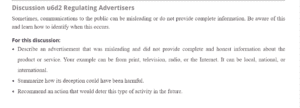Regulating Advertisers
There is a difference between pushing for a product’s sale and deceiving the public into buying a product. Many companies have faced problems with using the latter to sell their products. Accordingly, an example of false advertising and its possible implications shows why advertising should be regulated.
Are you looking for an original copy of“Regulating Advertisers”? Contact us; we are here to help.
Describe a misleading advertisement that did not provide complete and honest information about the product or service. Your example can be from print, television, radio, or the Internet. It can be local, national, or international.
In 2015, the Dannon Company advertised its new yogurt brand Activia by claiming that it has some ‘bacterial ingredients’ clinically proven to help with a person’s digestive system and improve immunity. The company used the actress Jamie Lee Curtis to push the product with the above information to the public. The company even proceeded to sell the product at a 30% higher price than the average market price. The company was sued for false advertising information after its claims were found to be false and settled for $45 million (Heilpern, 2016).
Summarize how its deception could have been harmful.
When a product is advertised as having medical benefits like Activia yogurt, consumers may buy it for specifically that reason. For people who experience real immunity issues or problems with their digestive system, the company may be exposing them to serious health issues when they use the product with the hope of getting their health status to a better state.
Recommend an action that would deter this type of activity in the future.
An action that would deter such actions in the future is government regulation on advertising. There must be clear rules on what is allowed and what is not about consumer product advertising. Companies that proceed to break such rules should be held responsible through hefty fines and even the possibility of their business license being revoked. This will help protect consumers from false advertising that can harm them.
Other Related Post: HIM 6320 Assignment 4
References
Heilpern, W. (2016, March 31). Eighteen false advertising scandals cost some brands millions. Business Insider. Retrieved 24 July from: https://www.businessinsider.com/false-advertising-scandals-2016-3?IR=T
ORDER A PLAGIARISM-FREE PAPER HERE
We’ll write everything from scratch
Question
Discussion u6d2 Regulating Advertisers
Sometimes, communications to the public can be misleading or do not provide complete information. Be aware of this and learn how to identify when this occurs.
For this discussion:
- Describe a misleading advertisement that did not provide complete and honest information about the product or service. Your example can be from print, television, radio, or the Internet. It can be local, national, or international.
- Summarize how its deception could have been harmful.
Regulating Advertisers
- Recommend an action that would deter this type of activity in the future.
Refer to the Discussion Participation Scoring Guide for posting expectations.
Discussion Participation Scoring Guide
| Discussion Participation Grading Rubric | ||||
| Criteria | Non-performance | Basic | Proficient | Distinguished |
| Applies relevant course concepts, theories, or materials correctly. | Does not explain relevant course concepts, theories, or materials. | Explains relevant course concepts, theories, or materials. | Applies relevant course concepts, theories, or materials correctly. | Use examples or supporting evidence to analyze course concepts, theories, or materials correctly. |
| Collaborates with fellow learners, relating the discussion to relevant course concepts. | Does not collaborate with fellow learners. | Collaborates with fellow learners without relating the discussion to the relevant course concepts. | Collaborates with fellow learners, relating the discussion to relevant course concepts. | Collaborates with fellow learners, relating the discussion to relevant course concepts and extending the dialogue. |
| Applies relevant professional, personal, or other real-world experiences. | Does not contribute professional, personal, or other real-world experiences. | Contributes professional, personal, or other real-world experiences but lacks relevance. | Applies relevant professional, personal, or other real-world experiences. | Applies relevant professional, personal, or real-world experiences to extend the dialogue. |


